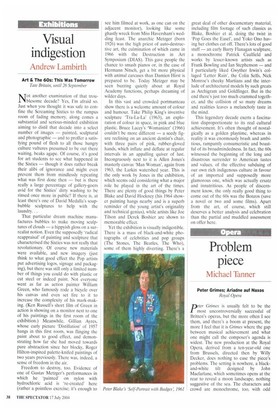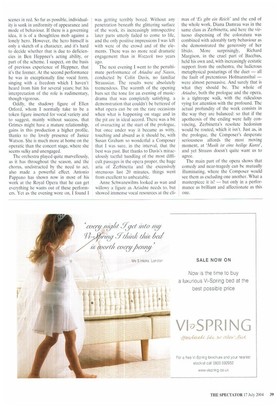Problem piece
Michael Tanner
Peter Grimes; Ariadne auf Naxos Royal Opera
rpter Grimes is usually felt to be the / most uncontroversially successful of Britten's operas, but the more often I see them, and there's a boom at present, the more I feel that it is Grimes where the gap between musical achievement and what one might call the composer's agenda is widest. The new production at the Royal Opera. derived from a ten-year-old one from Brussels, directed then by Willy Decker, does nothing to ease the piece's problems. The setting is nowhere, a blackand-white tilt designed by John Macfarlane, which sometimes opens at the rear to reveal a moon landscape, nothing suggestive of the sea. The characters and crowd are monochrome, too, with odd
scenes in red. So far as possible, individuality is sunk in uniformity of appearance and mode of behaviour. If there is a governing idea, it is of a thoughtless mob against a lonely hero. However, the hero himself is only a sketch of a character, and it's hard to decide whether that is due to deficiencies in Ben Heppner's acting ability, or part of the scheme. I suspect, on the basis of previous experience of Heppner, that it's the former. At the second performance he was in exceptionally fine vocal form, singing with a freedom which I haven't heard from him for several years; but his interpretation of the role is rudimentary, though vigorous.
Oddly, the shadowy figure of Ellen Orford, whom I normally take to be a token figure inserted for vocal variety and to suggest, mainly without success, that Grimes might have a mature relationship, gains in this production a higher profile. thanks to the lovely presence of Janice Watson. She is much more at home on the operatic than the concert stage, where she seems sulky and unengaged.
The orchestra played quite marvellously, as it has throughout the season, and the chorus, undistracted by the need to act, also made a powerful effect. Antonio Pappano has shown now in most of his work at the Royal Opera that he can get everything he wants out of these performers. Yet as the evening wore on, I found I was getting terribly bored. Without any penetration beneath the glittering surface of the work, its increasingly introspective later parts utterly failed to come to life, and the only positive impressions I was left with were of the crowd and of the elements. There was no more real dramatic engagement than in Wozzeck two years ago.
The next evening I went to the penultimate performance of Ariadne auf Naxos, conducted by Colin Davis, no familiar Straussian. The results were absolutely tremendous. The warmth of the opening bars set the tone for an evening of musicdrama that was completely satisfying, a demonstration that couldn't be bettered of what opera can be on the rare occasions when what is happening on stage and in the pit are in ideal accord, There was a bit of overacting at the start of the prologue, but once under way it became as witty, touching and absurd as it should be, with Susan Graham so wonderful a Composer that I was sure, in the interval, that the best was past. But thanks to Davis's miraculously tactful handling of the most difficult passages in the opera proper, the huge aria of Zerbinetta and the excessively strenuous last 20 minutes, things went from excellent to unbeatable.
Anne Schwanevvilms looked as wan and willowy a figure as Ariadne needs to, but showed immense vocal resources at the cli
max of 'Es gibt em n Reich' and the end of the whole work. Diana Damrau was in the same class as Zerbinetta, and here the virtuoso dispensing of the coloratura was combined with adorably tarty behaviour as she demonstrated the generosity of her libido. More surprisingly, Richard Margison, in the cruel part of Bacchus, held his own and, with increasingly ecstatic support from the orchestra, the ludicrous metaphysical posturings of the duet — all the fault of pretentious Hofmannsthal — were almost persuasive. And surely that is what they should be. The whole of Ariadne, both the prologue and the opera, is a tightrope walk, with the ridiculous vying for attention with the profound. The actual profundity of the work consists in the way they are balanced: so that if the apotheosis of the ending were fully convincing, Zerbinetta's resolute hedonism would be routed, which it isn't. Just as, in the prologue, the Composer's desperate seriousness affords the most moving moment, at `Musik ist eine heilige Kunst', and yet Strauss doesn't quite want us to agree.
The main part of the opera shows that comedy and near-tragedy can be mutually illuminating, where the Composer would see them as excluding one another. What a masterpiece it is — but only in a performance as brilliant and affectionate as this one.



























































 Previous page
Previous page